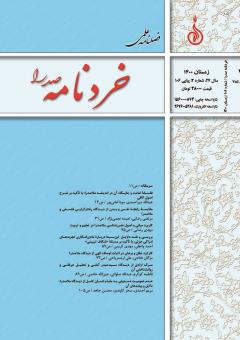فلسفۀ امامت و جایگاه آن در اندیشه ملاصدرا؛ با تأکید بر شرح اصول کافی
محورهای موضوعی : ملاصدراپژوهی و اندیشۀ حکمت متعالیهعبدالله میراحمدی 1 , مونا امانی پور 2
1 - استادیار گروه علوم قرآن و حدیث، دانشگاه خوارزمی، تهران،ایران
2 - استادیار گروه علوم قرآن و حدیث، دانشگاه علامه طباطبائی، تهران، ایران
کلید واژه: فلسفة امامت, اثبات وجود امام, قاعدة امكان اشرف, خصائص امام, شرح الاصول الكافي, ملاصدرا,
چکیده مقاله :
تأمّل در مباحث كتاب شرح الاصولالكافي نشان ميدهد كه صدرالمتألهين در اين اثر سعي نموده امامت و ماهيت آن را ـبعنوان مقامي انتصابي از جانب خداوندـ با حقيقتهاي بيان شده در سخنان ائمة معصومين(ع) تفسير و تطبيق نمايد. ملاصدرا با وجود صبغة عقلي و شرعي مفهوم امامت و رهيافتهاي گوناگون در اين زمينه، هرگز به قرائت بشري و غيرالهي از اين منصب نپرداخته، بلكه با اصالتبخشي و توجه به آموزههاي روايي و باورهاي كلامي شيعه، در تبيين روايات «كتاب الحجة» بعنوان بخشي از كتاب الكافي، بر فرابشري و الهيبودن اين مقامپافشاري ميكند. او هنگام بحث از مفهوم امامت، ضمن طرح و نقد ديدگاه فرقههاي مختلف اسلامي در موضوع نصب، وجود امام(ع) را براساس قاعدة امكان اشرف ضروري ميداند و ويژگيها و امتيازهايي را براي اثبات حجتبودن امام(ع) برميشمارد.
A study of the discussions of the book Sharḥ uṣūl al-kāfī reveals that Mullā Ṣadrā has tried in this book to interpret Imāmah (leadership) and its nature – as a position appointed by God – based on the truths in the words of the Infallible Imams. In spite of the rational and shar‘ī nature of the concept of Imāmah and the different approaches to it, Mullā Ṣadrā has never provided a human-oriented and non-divine interpretation of this position. Rather, through granting principliality and attending to the narrative and Kalāmi beliefs in Shi‘ism, he emphasizes the ultra-human and divine status of this position when explaining the narrations in kitāb al-ḥujjah as a section of al-Kāfī. When discussing the concept of Imāmah and while posing and criticizing the views of various Islamic sects regarding the problem of appointment, Mullā Ṣadrā acknowledges that the existence of Imam is necessary based on the principle of the noblest possibility. Moreover, he refers to certain features and privileges in order to demonstrate that Imām is the proof of God.
